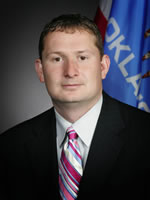Corn Files Legislation to Stabilize State Budget
 Sen. Kenneth Corn
Sen. Kenneth Corn
In response to declining budget projections and a national economic crisis that may eventually be the worst seen by the country in many decades, Sen. Kenneth Corn has filed legislation that would bring long-term stability to the state budget and security to Oklahoma citizens.
Senate Joint Resolution 2 calls for a Constitutional Amendment to be considered by voters which would require certification of the 10-year average of gross production tax revenue and would limit appropriations of revenues over that amount to one-time expenditures. Corn filed the legislation in the 2007 and 2008 legislative sessions, but it has not been heard by the Legislature. The Poteau Democrat said the proposal would help ensure the state doesn’t repeat mistakes made in the 1980’s oil bust.
“It isn’t wise to base recurring expenditures on an increasingly volatile commodity,” said Corn, D-Poteau. “We’ve seen energy prices fluctuate wildly over the course of the past several years, and in turn we’ve seen fluctuating projections for revenue growth. By installing a mechanism to limit appropriation of gross production revenues above the 10-year average to one-time expenditures, we can provide greater stability and security in the state budget.”
Corn explained that any excess growth production revenue could be spent on vital capital needs, including road and bridge repairs. With a recession looming, Corn said, it’s time for the Legislature to take action and help prevent future budget shortfalls.
“The home-lending crisis has been snowballing for months, and we’ve seen a domino effect that has devastated economies throughout the nation,” Corn said. “Though we’ve been fortunate to experience some economic stability in Oklahoma, it would be foolish to think we’re immune to a nationwide recession. With economists sending harsh warnings regarding the severity of a pending recession, it’s now more important than ever that this proposal be considered.”
“If not, we may be forced to look at this as another missed opportunity to exercise restraint and responsible financial stewardship.”
 Oklahoma Senate
Oklahoma Senate

